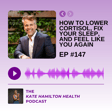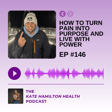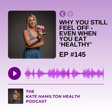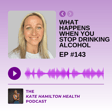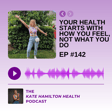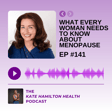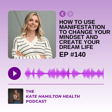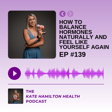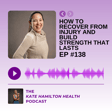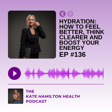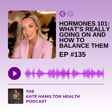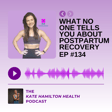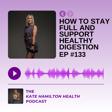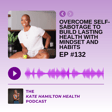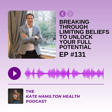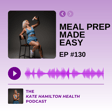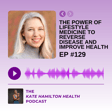
#122: Chris Burres: Can this molecule help you live longer? ESS60 and Longevity
In this episode of the Kate Hamilton Health Podcast, I sit down with longevity expert, scientist, and best-selling author Chris Burres to explore groundbreaking insights into living longer and healthier. Chris, co-founder of MyVitalC and author of Live Longer and Better, shares his compelling journey from mechanical engineering to becoming a leading voice in the world of anti-aging and optimal wellness.
We dive into the fascinating science behind ESS60, a revolutionary molecule derived from Carbon 60, and how it may support a longer healthspan through its potent antioxidant and anti-inflammatory effects. From enhancing mitochondrial health to easing menopause symptoms, Chris sheds light on the real potential of ESS60. We also talk about the role of mindset, the power of healthy fats and proteins, and simple but effective longevity tips you can start using today. If you're curious about how to optimize your vitality at any stage of life, this conversation is a must-listen!
EPISODE HIGHLIGHTS:
[0:00] - Welcome to the show + introducing longevity scientist Chris Burres
[0:40] - Chris shares his unexpected path from engineering to health innovation
[3:56] - What is ESS60? The origin and science of this powerful molecule
[7:17] - Real-life health benefits: From energy to inflammation support
[16:17] - Lifestyle matters: Longevity begins with mindset and daily habits
[22:48] - Quick note on my health coaching services and how I help clients
[27:39] - Menopause, mitochondria & what every woman should know
[29:11] - Oxidative stress explained: What it means for your aging cells
[31:19] - The "Boss Theory": Why mitochondria might run the show
[32:48] - Can ESS60 ease menopause symptoms? The research and results
[33:51] - Listener stories and testimonials: What users are experiencing
[47:21] - Where to start: How to try ESS60 and product recommendations
[49:59] - Final thoughts and why small changes matter for long-term health
Links & Resources:
If you enjoyed this episode, please subscribe, leave a review, and share it with friends who might benefit. For more health and fitness tips, follow me on Instagram and TikTok @katehamiltonhealth.
Disclaimer: This episode is for informational purposes only and is not intended as medical advice. I am not promoting or endorsing any specific product or supplement discussed in this episode. Always consult with your healthcare provider before starting any new supplement or health regimen.
Music b LiQWYD Free download: hypeddit.com/link/xxtopb [http://hypeddit.com/link/xxtopb] Promoted by FreeMusicPromo [https://www.youtube.com/channel/UCbycji-eySnM3WD8mbxPUSQ] / @freemusicpromo

